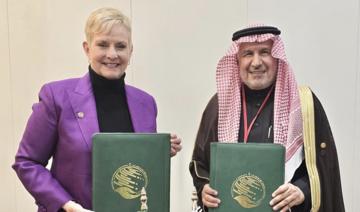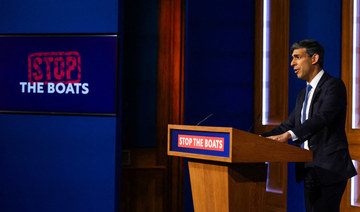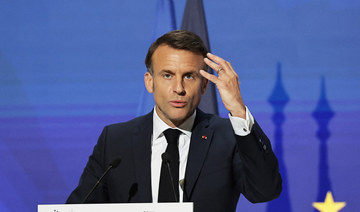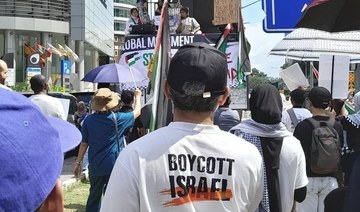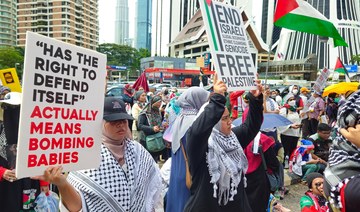AHMEDABAD: Flash flooding triggered by torrential rains has killed 41 people in India’s western Gujarat state, as the annual monsoon season hits the country, a disaster management official said Thursday.
Authorities have evacuated more than 10,000 residents mainly from coastal areas of Gujarat following heavy rains in the last 24 hours, the state government said in a statement.
The coastal district of Amreli was the worst affected, with 36 people killed in flood-related incidents, a duty officer in the state’s disaster control room said.
“There have been 41 deaths across the state with 36 in Amreli, three in Bhavnagar and two in Rajkot districts,” the official told AFP.
Thirteen of the deaths in Amreli occurred when two houses collapsed in the flooding, local police deputy superintendent Pinakin Parmar told AFP.
India normally sees flooding during the monsoon but the intensity of this year’s rains in Gujarat has surprised many.
The air force has been deployed to help with evacuations, including that of 44 passengers of a bus stuck on a flooded highway near Amreli town, the government’s statement said.
In photos released by the defense ministry, families were shown huddling on rooftops of flooded homes awaiting rescue, along with washed out train tracks and roads.
India’s weather bureau has forecast more heavy rain in Gujarat for the next two days.
As the monsoon sweeps across the country, flood warnings have also been issued in northern Jammu and Kashmir state — hit by floods last year that claimed about 300 lives.
Waters were receding in northeastern Assam following floods there last week. But more than 20,000 people were still waiting to return home after moving to higher ground after the rain hit, the Press Trust of India said.
Nearly 900 hectares (2,223 acres) of farm land was also still under water in that state, the news agency added.
The monsoon is vital for South Asia especially for crop production. India receives nearly 80 percent of its annual rainfall between June to September period.
41 dead in western India flood
41 dead in western India flood

Russia says it shot down four US-made long range missiles over Crimea

- The ATACMS missiles, with a range up to 300km were used for the first time in the early hours of April 17
The ministry said later that Russian aircraft and air defense systems had downed a total of 15 ATACMS in the past week.
On Tuesday, Russian officials said Ukraine had attacked Crimea with ATACMS in an attempt to pierce Russian air defenses of the annexed peninsula but that six had been shot down.
A US official said in Washington last month that the United States secretly shipped long-range missiles to Ukraine in recent weeks.
The ATACMS missiles, with a range up to 300km were used for the first time in the early hours of April 17, launched against a Russian airfield in Crimea that was about 165 km (103 miles) from the Ukrainian front lines, the official said.
The Pentagon initially opposed the long-range missile deployment, concerned that taking the missiles from the American stockpile would hurt US military readiness.
There were also concerns that Ukraine would use them to attack targets deep inside Russia, a step which could lead to an escalation of the war toward a direct confrontation between Russia and the United States.
Separately on Saturday, the Russian defense ministry said that in the last week its forces had destroyed a military train carrying equipment and arms produced in the West and supplied to Ukraine by NATO.
The scale of the damage, exact date and location were not disclosed.
Reuters is not immediately able to corroborate battlefield accounts from either side.
On Thursday, British Foreign Secretary David Cameron promised 3 billion pounds ($3.7 billion) of annual military aid for Ukraine for “as long as it takes,” adding that London had no objection to its weapons being used inside Russia, drawing a strong rebuke from Moscow.
South Sudan removes newly imposed taxes that had triggered suspension of UN food airdrops
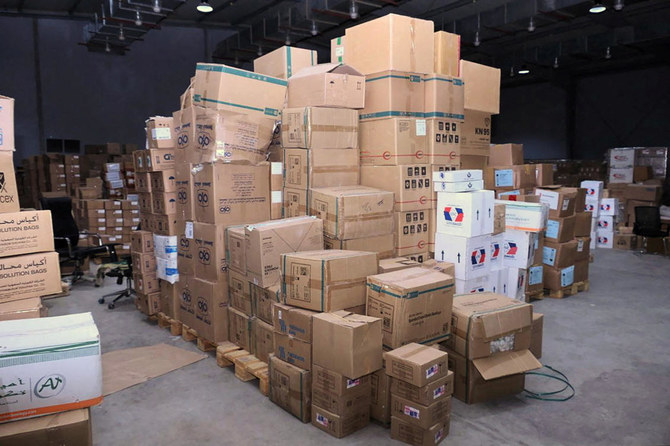
- The UN earlier this week urged South Sudanese authorities to remove the new taxes, introduced in February
- There was no immediate comment from the UN on when the airdrops could resume
JUNA, South Sudan: Following an appeal from the United Nations, South Sudan removed recently imposed taxes and fees that had triggered suspension of UN food airdrops. Thousands of people in the country depend on aid from the outside.
The UN earlier this week urged South Sudanese authorities to remove the new taxes, introduced in February. The measures applied to charges for electronic cargo tracking, security escort fees and fuel.
In its announcement on Friday, the government said it was keeping charges on services rendered by firms contracted by the UN peacekeeping mission in South Sudan.
“These companies are profiting ... (and) are subjected to applicable tax,” Finance Minister Awow Daniel Chuang said.
There was no immediate comment from the UN on when the airdrops could resume.
Earlier, the UN Humanitarian Affairs Agency said the pausing of airdrops had deprived 60,000 people who live in areas inaccessible by road of desperately needed food in March, and that their number is expected to rise to 135,000 by the end of May.
The UN said the new measures would have increased the mission’s monthly operational costs to $339,000. The UN food air drops feed over 16,300 people every month.
At the United Nations in New York, UN spokesman Stéphane Dujarric said the taxes and charges would also impact the nearly 20,000-strong UN peacekeeping mission in South Sudan, “which is reviewing all of its activities, including patrols, the construction of police stations, schools and health care centers, as well as educational support.”
An estimated 9 million people out of 12.5 million people in South Sudan need protection and humanitarian assistance, according to the UN The country has also seen an increase in the number of people fleeing the war in neighboring Sudan between the rival military and paramilitary forces, further complicating humanitarian assistance to those affected by the internal conflict.
More migrant dinghies cross Channel to England despite Rwanda threat
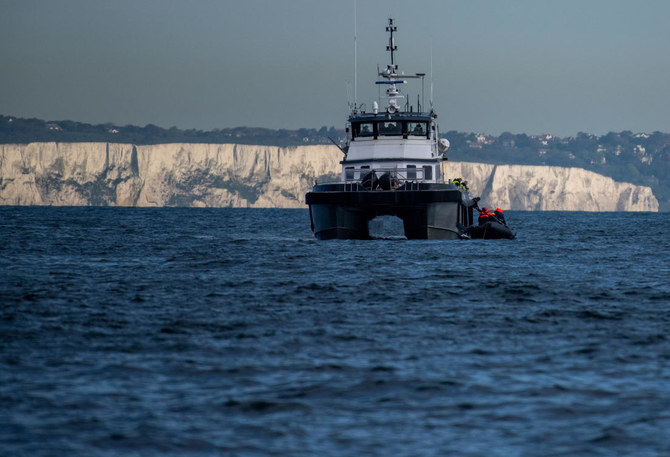
- The arrivals illustrate the difficulties British Prime Minister Rishi Sunak faces on his pledge to tackle illegal migration and “stop the boats“
- Sunak hopes his flagship Rwanda policy to deport those arriving in Britain without permission to the African nation will deter people from making the Channel crossing
STRAIT OF DOVER: Dozens of people in two rubber dinghies reached the southern coast of England on Saturday, the latest among thousands of asylum-seeking migrants to make the risky sea crossing from France this year.
Bobbing on the waves of the English Channel on a clear morning, the boats sailed across the narrow strip of sea separating France and Britain, with a French naval vessel following them until they reached English waters.
Their largely male passengers, some of whom were in orange life jackets and waving, were taken aboard a British Border Force vessel off Dover.
The arrivals illustrate the difficulties British Prime Minister Rishi Sunak faces on his pledge to tackle illegal migration and “stop the boats,” ahead of a national election expected later this year.
More than 8,000 people have arrived so far this year on small boats, with many fleeing war or famine and traveling through Europe to Britain, making the start of this year a record for such arrivals.
Sunak hopes his flagship Rwanda policy to deport those arriving in Britain without permission to the African nation will deter people from making the Channel crossing. Five people died in the attempt last month.
The government hopes to operate the first flights to Rwanda in 9-11 weeks.
“The unacceptable number of people who continue to cross the Channel demonstrates exactly why we must get flights to Rwanda off the ground as soon as possible,” a spokesperson for Britain’s Home Office said.
“We continue to work closely with French police who are facing increasing violence and disruption on their beaches as they work tirelessly to prevent these dangerous, illegal and unnecessary journeys.”
UK opposition suffers major Muslim vote losses in local elections

- Shadow home secretary: ‘Many people feel really strongly’ about Gaza ‘and rightly’
- Labour MP: ‘It’s not just Muslims. On our doorknocks, we’ve had a lot of middle-class white voters raise it as well’
LONDON: A series of local election victories by the UK’s opposition Labour Party has been overshadowed by a major fall in support among Muslim voters, leading to concern within the party ahead of a general election later this year.
After local elections were held across the country on Thursday, Labour suffered key losses in areas with high Muslim populations due to controversies over the party’s stance on the Gaza war.
Labour must do some “searching” in response to “questions” over its performance, one MP said.
The potential loss of Labour candidate Richard Parker in the West Midlands mayoralty election led to a racism row after an unnamed party source blamed “the Middle East” on deciding the race.
In total, the party gained more than 140 council seats during the elections, The Guardian reported.
But those gains are overshadowed by the potential West Midlands defeat and the Conservative candidate for mayor of London, Susan Hall, running a closer race against incumbent Sadiq Khan than previously expected.
Labour have “trouble brewing on their left flank” after focusing on traditionally rural and whiter areas, said Rob Ford, a politics professor at the University of Manchester.
“There has been a substantial loss of support in heavily Muslim areas and they are going backwards a bit in progressive areas and areas with students. It is progress at a price,” he added.
By offsetting urban losses with gains among rural voters, Labour would win about 34 percent of votes at a general election compared to 25 percent for the Conservatives, the BBC reported.
Yet fear of bleeding urban voters, including Muslims, is driving anxiety in the party ahead of the general election, sources told The Guardian.
“The polls (which predicted a 20-point lead for Khan) were completely wrong, this is going to be much closer than expected,” one source said.
A source in Birmingham, where independent candidate Akhmed Yakoob stood as a spoiler to Labour, said: “Yakoob is picking up over 50 percent in some inner-city wards, so the Gaza impact may be bigger than first estimated.”
Labour also suffered a shock loss in Oldham, losing control of the council after a number of seats were taken by pro-Palestinian independent candidates.
In Manchester, the party lost its deputy leader to a candidate from MP George Galloway’s Workers Party of Britain.
Jess Phillips, Labour MP for Birmingham Yardley, told the “Electoral Dysfunction” podcast in the wake of the vote that the party will have to “wake up and face” the issues that led to losses against independent and Workers Party of Britain candidates.
“I very much expect, as the mayoral votes come in, that in places like Birmingham, Bradford, places with high Muslim populations, as we’ve seen overnight in Oldham, that the Labour Party will have some questions that they have, and some searching to do themselves,” she added, according to Sky News.
Areas with a proportion of Muslim voters higher than 20 percent recorded average losses of 17.9 points for Labour.
The comments by a party source concerning the West Midlands race have led to a post-election race row.
“It’s the Middle East, not West Midlands that will have won (Conservative Mayor Andy) Street the mayoralty. Once again Hamas are the real villains,” the Labour source reportedly told the BBC.
The remarks were condemned by figures including Labour MP Bell Ribeiro-Addy, the Daily Telegraph reported.
“This is a disgusting way to talk about Muslim voters, conflating them with Hamas and treating them as a monolith,” she said. “It reeks of racism and entitlement. Such comments should have no place in the Labour Party.”
According to The Times, MP Zarah Sultana said: “Once again, I’m deeply disturbed by Islamophobic quotes given to the media by ‘Labour sources.’
"When politicians are confronted with racist bile, it should be immediately condemned. As a party we need to listen to and acknowledge concerns, not hold British Muslims in contempt.”
Yvette Cooper, Labour’s shadow home secretary, conceded that the party’s stance on a Gaza ceasefire was “partly” a factor in the surprise defeats.
“Many people feel really strongly about this — and rightly, because tens of thousands of people have been killed, including the majority of them women and children,” she said.
Muslim vote organizers hailed the success of the elections in sending a message to Labour leader Keir Starmer.
Party sources warned that Labour must work overtime to regain the trust of Muslim voters ahead of a general election expected later this year.
“People use local elections to send the government — and sometimes the opposition — a message,” a senior Labour source told The Times.
“The damage is done and even though our position is much better now, if Israel pushes into Rafah people will say we didn’t do enough to urge restraint right at the start.”
A Labour MP added: “It’s terminal with a lot of people, and it’s not just Muslims. On our doorknocks, we’ve had a lot of middle-class white voters raise it as well.”
KFC stores in Malaysia shutter amid anti-Israel boycott

- KFC is not on Malaysian boycott movement’s list, but consumers see it as linked to Israel
- Franchise operator cites ‘challenging economic conditions’ as reason for closures
KUALA LUMPUR: Scores of KFC outlets have closed in Malaysia amid calls to boycott the chain and other brands accused of links with Israel.
Since the outbreak of Israel’s deadly attacks on Gaza in October, many Malaysian citizens have backed a growing refusal to buy products from the Western companies seen as having relations with Tel Aviv.
KFC is among a number of brands that have been reeling from falling revenues, as those who join the boycott movement see them facilitating the Israeli strikes, which have already killed nearly 35,000 people in the Palestinian territory, mostly women and children.
The US-origin fast-food chain has closed more than 100 outlets across Malaysia since October, according to local media estimates.
KFC Malaysia operator QSR Brands Holdings admitted in a statement earlier this week to a temporary closure to “manage increasing business costs,” which it attributed to “challenging economic conditions.”
QSR Brands did not say how many outlets had been closed or if the action was due to a loss in sales caused by the boycott.
The company, which runs over 600 KFC restaurants across the Southeast Asian nation, said staff from affected outlets were given the opportunity to “relocate to busier” stores.
Major companies with international brand names in Malaysia have in recent months reported losses due to the boycott, even if they were not original targets of the action.
In February, the parent company of the US-origin coffee chain Starbucks in Malaysia said the snub by customers led to a near 40 percent drop in revenue. The news followed an earlier claimed loss of profits and job cuts by the country’s McDonald’s franchise.
The anti-Israel boycott in Malaysia has been spearheaded by the local chapter of the global Boycott, Divestment, Sanctions movement. Besides McDonald’s, other popular brands it listed included Burger King, Puma, Airbnb and Pizza Hut.
BDS Malaysia Chairman Mohd. Nazari Ismail told Arab News that KFC was not on the group’s boycott list, but it might be targeted because of its US origins.
“Many Malaysians perceive any American fast-food operator to be related to Israel including KFC,” he said.
“KFC is not on our list because BDS’s strategy is to focus on a limited number of companies to maximize the impact of our efforts. But it is on the list of other organizations that call for boycott of all companies that are related to Israel.”
Many Malaysians who reacted on social media to the news of the outlets closing commented “alhamdulillah,” or “thank God,” with some singling out KFC’s parent company in the US, the American fast-food multinational Yum Brands.
“KFC’s parent company, Yum Brands, invests in Israeli startups,” said X.com user meraungkesepian.
Others targeted the chain’s quality, saying it had fallen off the mark, leading to their shunning of the brand.
“Many have boycotted KFC not 100 percent because of Israel. But because KFC doesn’t have any quality,” said X.com user tonnychua9988 in Malay.
The boycott of KFC was expected, according to Syaza Farhana Mohamad Shukri, associate professor of political science at the International Islamic University Malaysia.
“I think the KFC boycott was inevitable because what is more American than Kentucky Fried Chicken?” she said.
“It is all based on sentiment ... companies that appear to be American-based get the brunt of the people’s anger.”
More than 60 percent of Malaysia’s 33 million people are Muslim, and the country has been fiercely supportive of the Palestinian struggle for decades.
It has no formal relations with Israel and bars Israeli nationals from entering its territory.
In December, Malaysia also barred Israeli and Israel-bound ships from docking at its ports.



